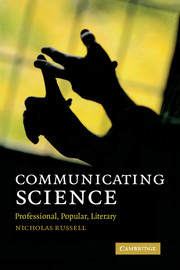Book contents
- Frontmatter
- Contents
- Introduction: What this book is about and why you might want to read it
- Prologue: Three orphans share a common paternity: professional science communication, popular journalism and literary fiction are not as separate as they seem
- Part I Professional science communication
- 1 Spreading the word: problems with publishing professional science
- 2 Walk like an Egyptian: the alien feeling of professional science writing
- 3 The future's bright? Professional science communication in the age of the internet
- 4 Counting the horse's teeth: professional standards in science's barter economy
- 5 Separating the wheat from the chaff: peer review on trial
- Part II Science for the public: what science do people need and how might they get it?
- Part III Popular science communication: the press and broadcasting
- Part IV The origins of science in cultural context: five historic dramas
- Part V Science in literature
- Index
- References
3 - The future's bright? Professional science communication in the age of the internet
Published online by Cambridge University Press: 02 December 2010
- Frontmatter
- Contents
- Introduction: What this book is about and why you might want to read it
- Prologue: Three orphans share a common paternity: professional science communication, popular journalism and literary fiction are not as separate as they seem
- Part I Professional science communication
- 1 Spreading the word: problems with publishing professional science
- 2 Walk like an Egyptian: the alien feeling of professional science writing
- 3 The future's bright? Professional science communication in the age of the internet
- 4 Counting the horse's teeth: professional standards in science's barter economy
- 5 Separating the wheat from the chaff: peer review on trial
- Part II Science for the public: what science do people need and how might they get it?
- Part III Popular science communication: the press and broadcasting
- Part IV The origins of science in cultural context: five historic dramas
- Part V Science in literature
- Index
- References
Summary
Dr Esme Smith added the finishing touches to the Mark 6 version of her neuropeptide paper, pacing back and forth dictating and watching the words appear on her wall screen. Pausing, she passed a finger over her snazzy Hand Assistant to get the whole last paragraph on screen. Frowning slightly she read it through, glanced at her time bar, mentally rehearsed the chores she had to do before picking up the children (unusually Richard had to be in the office rather than the home console) and decided it would do. She swiped her finger again, checked the total sum in Euros, and sent Mark 6 into cyberspace.
She had put the first four versions on the private British science site, Impact One, but their charges were becoming excessive and the Nova Brainstem Foundation who funded her work refused to pay for it anymore. Impact One had a good reputation, most major players in her field were keyed in for on-the-hour alerts, and the Nobel Prize Winner submission index was high at 5.043, but she had become increasingly unhappy with the site, especially with the quality of review and post-review comments on the professional (peer) file. The Mark 1 version of the paper had been double blind (no one knew who had written it and reviewers were editor-selected and anonymous) but a reviewer had recognized who she was and used some hurtful put-downs. But overall she had scarcely altered the Mark 1 (Beta) paper and it appeared as Mark 2 under her name (with her Research Assistant and one of the Ph.D. students as co-authors). […]
- Type
- Chapter
- Information
- Communicating ScienceProfessional, Popular, Literary, pp. 28 - 39Publisher: Cambridge University PressPrint publication year: 2009



